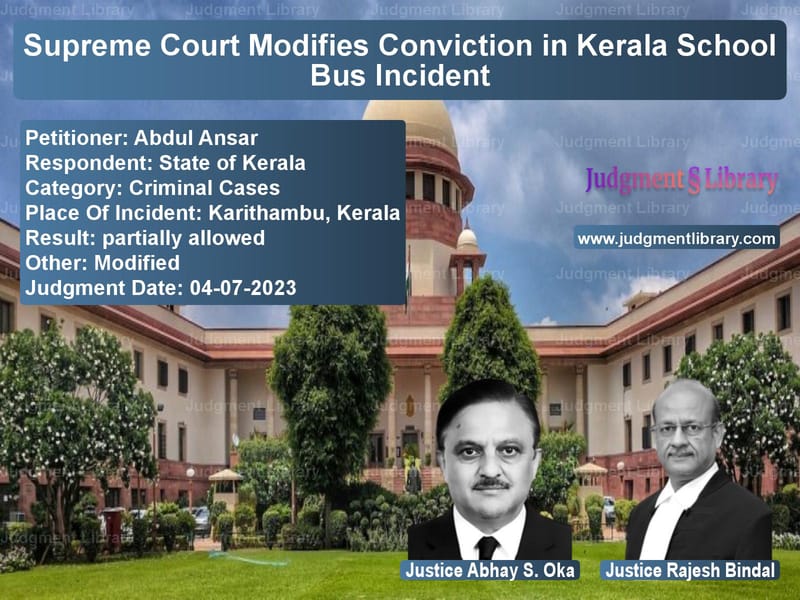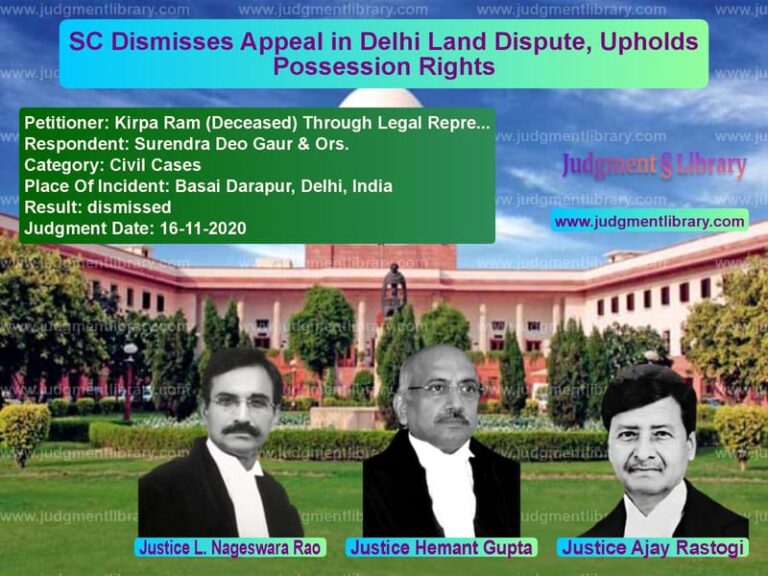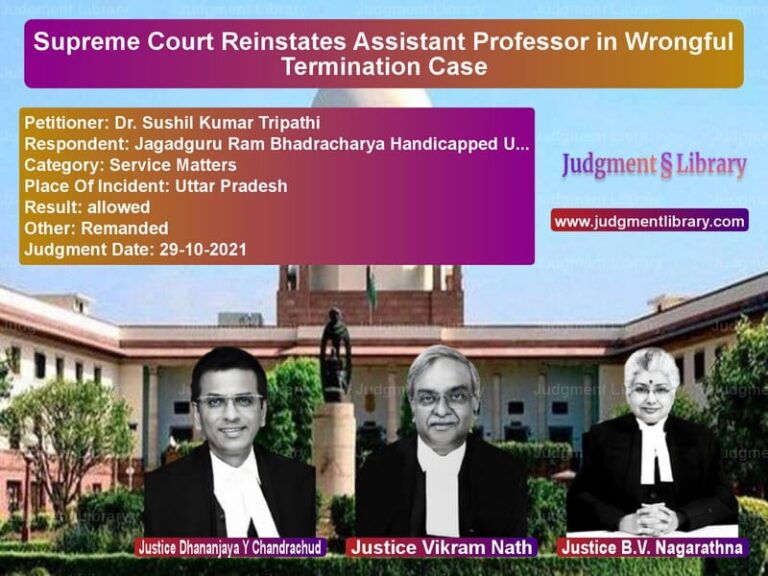Supreme Court Modifies Conviction in Kerala School Bus Incident
The case of Abdul Ansar v. State of Kerala is a significant ruling where the Supreme Court modified a conviction under Section 308 IPC (Attempt to Commit Culpable Homicide) to Section 338 IPC (Causing Grievous Hurt by Act Endangering Life). The Court found that while the appellant, a bus conductor, was negligent, there was no intent to cause grievous harm. The ruling clarifies the legal threshold for attempt to culpable homicide and establishes a precedent for reckless endangerment in public transport.
Background of the Case
The case dates back to August 18, 2005, when the victim, Josia (PW-1), an eighth-grade student, attempted to board a school bus at the Karithambu bus stop along with her younger sister, Jovan (PW-7). Due to overcrowding, she hesitated but eventually decided to board the bus.
According to the prosecution, while Josia was stepping onto the bus, accused No. 3 (cleaner) allegedly pushed her off, and before she could regain balance, Abdul Ansar (the conductor and accused No. 2) rang the bell, signaling the driver to move. As a result, Josia fell under the left rear wheel of the bus, sustaining severe injuries, including a fractured pelvis.
The Prosecution charged the accused under Sections 279 and 308 read with Section 34 IPC for rash and negligent driving and attempt to commit culpable homicide.
Key Legal Issues
- Did the appellant’s actions amount to an attempt to commit culpable homicide?
- Was the negligence of the conductor sufficient to establish criminal liability under Section 308 IPC?
- Should the conviction be modified to a lesser offense based on the evidence?
Petitioner’s (Abdul Ansar’s) Arguments
The appellant, represented by his counsel, contended:
- That the charge under Section 308 IPC was unsustainable as he had no intent or knowledge that his act of ringing the bell could cause fatal harm.
- That the primary blame lay with the cleaner, who was acquitted by the High Court, and thus, the conductor’s liability should be reconsidered.
- That the incident was accidental and did not meet the criteria for an attempt to commit culpable homicide.
- That he had already undergone 36 days of imprisonment and should not be subjected to further incarceration.
Respondent’s (State of Kerala’s) Arguments
The State, represented by its counsel, countered:
- That as a conductor, the appellant had a duty to ensure the safe boarding of passengers, particularly school children.
- That the appellant was aware of the overcrowding and still gave the signal to start the bus without ensuring the victim’s safety.
- That the injuries sustained were severe, including a fractured pelvis, which could have resulted in death.
- That the incident should be classified under Section 308 IPC as the appellant’s actions recklessly endangered human life.
Supreme Court’s Observations
On the Applicability of Section 308 IPC
The Court ruled that the charge under Section 308 IPC was unsustainable because:
“There is no evidence to suggest that the appellant had any intention to cause death or knowledge that his act was likely to cause death.”
The Court emphasized that intent and knowledge are essential ingredients of culpable homicide and were not established in this case.
On Negligence and Recklessness
However, the Court held that the appellant was guilty of negligence, stating:
“The appellant, as a conductor, had a duty to ensure that all passengers safely boarded the bus. His failure to take necessary precautions resulted in serious injuries to the victim.”
The Court referred to Section 338 IPC, which penalizes causing grievous hurt through rash or negligent acts endangering human life.
On the Modification of Conviction
The Court modified the conviction from Section 308 IPC to Section 338 IPC, ruling:
“The appropriate conviction in this case is under Section 338 IPC, as the appellant’s act, though negligent, does not rise to the level of culpable homicide.”
The Court further noted that since the incident occurred in 2005 and the appellant had already spent 36 days in custody, a sentence of six months simple imprisonment would be sufficient.
Final Judgment
The Supreme Court modified the sentence as follows:
- Conviction under Section 308 IPC quashed, replaced with Section 338 IPC.
- The appellant sentenced to six months simple imprisonment.
- The appellant was directed to pay Rs. 75,000 in compensation to the victim.
- Failure to pay the compensation would result in an additional one-month imprisonment.
Implications of the Judgment
This ruling has important legal implications:
- Clarification on Section 308 IPC: Establishes that mere negligence does not amount to an attempt to commit culpable homicide.
- Accountability for Public Transport Operators: Reinforces the duty of conductors and drivers to ensure passenger safety.
- Recognition of Reckless Endangerment: Sets a precedent for convicting individuals under Section 338 IPC for acts that cause serious injuries due to negligence.
Conclusion
The Supreme Court’s ruling in Abdul Ansar v. State of Kerala reinforces the distinction between negligence and culpable homicide. By modifying the conviction to Section 338 IPC, the Court struck a balance between ensuring accountability and preventing excessive punishment for negligence. This case serves as a reminder of the responsibilities of public transport operators in ensuring passenger safety.
Petitioner Name: Abdul Ansar.Respondent Name: State of Kerala.Judgment By: Justice Abhay S. Oka, Justice Rajesh Bindal.Place Of Incident: Karithambu, Kerala.Judgment Date: 04-07-2023.
Don’t miss out on the full details! Download the complete judgment in PDF format below and gain valuable insights instantly!
Download Judgment: abdul-ansar-vs-state-of-kerala-supreme-court-of-india-judgment-dated-04-07-2023.pdf
Directly Download Judgment: Directly download this Judgment
See all petitions in Negligence Claims
See all petitions in Road Accident Cases
See all petitions in Judgment by Abhay S. Oka
See all petitions in Judgment by Rajesh Bindal
See all petitions in partially allowed
See all petitions in Modified
See all petitions in supreme court of India judgments July 2023
See all petitions in 2023 judgments
See all posts in Criminal Cases Category
See all allowed petitions in Criminal Cases Category
See all Dismissed petitions in Criminal Cases Category
See all partially allowed petitions in Criminal Cases Category







